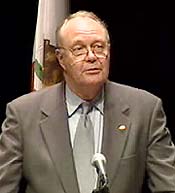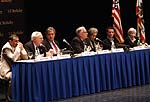Campus forum: Chancellor Robert Berdahl
These are the introductory remarks delivered by Chancellor Robert M. Berdahl at a forum of UC Berkeley faculty experts convened at Zellerbach Hall on April 1, 2003, to discuss the war with Iraq.
 'Having an opinion, however, is not the same as having a closed mind. If we hear only ourselves, our dialogue is a monologue. It advances no ideas.' —Chancellor Robert M. Berdahl |
Tonight we move to the intellectual conversation. We have many experts with us tonight to consider aspects of the war situation.
A great deal of thought has gone into the events of last night and tonight, and into Berkeley’s ongoing dialogue on the war. I thank our special advisory committee for keeping us out in front on this. Thanks also to our hosts tonight, International and Area Studies and the Institute of International Studies.
This is part of our program to conduct a debate about the war. Our intent is to put as many ideas on the table as we can for an informed and thoughtful public discussion. This is a unique role universities can perform. Particularly here at Berkeley, the range of expertise we can bring to the discussion is broad and deep. With civility and tolerance and the protection of the liberties in the U.S., we can ask the hard questions even in the dark times.
Obviously we all have personal positions on this subject — as indeed do I, positions that I have expressed elsewhere.
Watch the Webcast |
Some ask what is the importance of dialogue on this subject. We may already feel bombarded with information from multitudes of embedded reporters. But information is not wisdom. As you embed these reporters in the war, you may know LESS about the broad historical perspective, economic considerations, global implications and so forth. This is what we are here to discuss.
Political Science Professor David Leonard, dean of International and Area Studies, is moderator of our panel tonight. He joined the Berkeley faculty in 1976 after serving on the faculties of universities in Nairobi and Tanzania. Over the years he has served as advisor to the United Nations Development Program, the Food and Agricultural Organization, the World Bank, the United States Agency for International Development and others.
| Read the complete remarks by: Chancellor Berdahl Nezar AlSayyad Thomas G. Barnes David D. Caron Laura Nader Steve Weber Janet Yellen |
Since I have the mic, I’m going to get my questions in first. Here are a few concerns I ponder and hope the panel will address:


